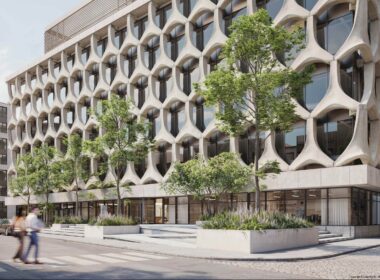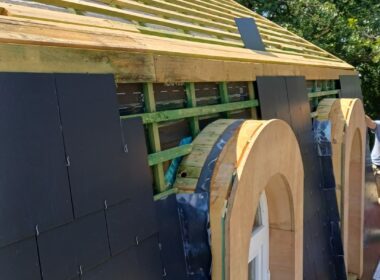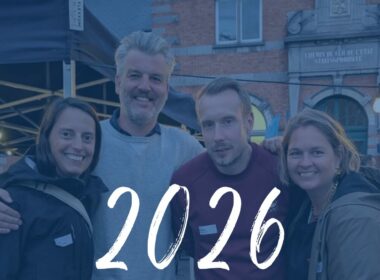Every year, many economic and political analysts share their forecasts for the coming years, very few of which actually materialise. Instead of indulging in crystal ball gazing, I prefer to express myself on the development that we have felt in the last few years. Right up to the very “hot” news of these last months.
Sustainable construction is no longer the utopian stuff of environmental hippies
For the past 5 years, we have been striving to build constructions that are more sustainable than when using conventional methods. At that time, it was just a matter of personal evidence and matching our beliefs with our achievements. Working according to our certainties was a luxury. Our profitability was severely challenged and we did not feel that our customers were particularly enthusiastic about our approach.
Today, I feel that the winds have changed. Individuals, architects, investors and politicians. It is becoming increasingly rare to find parties who are completely unconcerned about the issue. For the last 2 to 3 years, I have been meeting customers who tell me that they do not want to work with such and such a contractor because they do not seem to be able to work with biobased materials. This was proof to my most sceptical colleagues that the sustainable aspect of our work was not a mere utopian fad but a real investment in the future. On a broader scale, you only need to open a business newspaper to realise how sustainability is part of every serious investment strategy
An explosion of requests for proposals now… and tomorrow?
We receive an average of ten requests for proposals per week. A few months ago, we had only half of these. This phenomenon is not related to business success, but to energy costs. Potential customers are all asking for quick availability: ideally by the end of the year. While we support the public’s enthusiasm to insulate their homes more effectively, we deplore the conditions under which it is occurring.
Indeed, there is a correlation between cost, quality and insulation coefficient. Hence, there is a certain social discrimination according to available budget. There are incentives, of course, but these are not enough to cover the full cost of the renovation. In addition, customers must pay all invoices before submitting their application to the Brussels Region.
The result of this phenomenon is that the public is willing to use any company as long as it can meet their budget. Goodbye therefore to efficient and biobased insulation, with the return of insulations derived from petrochemicals. At the risk of running into professionals who are only interested in maximising their profits, to the detriment of the quality of the work and the materials. The current crisis could make a sales representative promising low prices and short deadlines more attractive than a serious company offering fair prices and reasonable deadlines according to its capabilities (see Availability of skilled labour and time to complete a job well done)
Difficult recruitment
If we wanted to develop our business on a larger scale, while remaining close to our values of sustainability and quality, the biggest obstacle would be recruitment. I am part of the generation that was led to believe that manual jobs were second best. However, today, construction has become such an important and complex issue that we need committed, motivated and informed people at all levels of the chain. Where is the success in a project that is intended to be sustainable if those delivering it do not understand the importance of the proper execution of the various technical aspects? The end result of a bold idea could turn into a disaster.
On the other hand, we feel the current enthusiasm among young adults to find a job with meaning, a new interest in our construction trades. However, the training process is long and not always easy when you are over a certain age. If we want to combine technicality and profitability (and therefore affordable prices), we need workers who have started their in-depth training at a young age. This is so that they can reach the top of their trade as adults, like high-level athletes. This could lead to considerable career development and a marked improvement in the sector as a whole. It is therefore high time, for the good of our societies, that the term worker becomes as prestigious as a doctor or lawyer.
There remains the remuneration of the workers and the resulting cost to the company. In our sector (roofing and wood construction), carrying out energy-efficient renovations is an extremely demanding activity. You have to be physically and mentally at your best and the days are long. The weekend is often synonymous with exhaustion. Do our workers get paid enough compared to other jobs? I don’t think so. Are they very expensive for the company and therefore for the customers? I am sure of it. In my opinion, this high cost of labour is one of the major impediments to sustainable, quality construction. So for circular and reuse renovations, which are even more time consuming, I sometimes have the bitter feeling that we are daydreaming. I would add to this the following personal reasoning: at the beginning of the materials crisis in around March 2020, I was looking forward to the rebalancing between materials and labour costs. I naively thought that this would lead to more reuse. Today, with inflation and salary indexation, forget it! Could we hope for tax reform that would lower the cost of our precious labour?
Political commitment through subsidies but too little quality control
We can be pleased with the governmental and European budgets allocated to the insulation and sustainability of buildings. However, this subject, which is often complex to implement, seems to me to be controlled far too little on the ground. On our roofing and carpentry sites, we are often both judge and jury. First of all, customers and sometimes architects are not always rigorously informed about the right implementation techniques. Even when this is the case, few people venture to our heights to inspect the work done. And let’s not talk about the EPB certifiers who do not take into consideration the proper implementation of the materials used.
It would be interesting to have more rigorous quality controls of what is produced with, why not, additional bonuses for the customers who have chosen the right professionals.
Welcome support through the ecobuild.brussels cluster network
Since we became a full member of the cluster, we have received several offers from architects and engineering firms. Indeed, the solidarity and links uniting the professionals seem to be an asset to make project managers aware of the quality of a perfectly insulated roof.
Conclusion
While the quest for energy retrofitting seems to be the keyword for those who have a budget at the end of 2022, professionals must not be overwhelmed by quantity to the detriment of quality.
And if the political world really wants sustainable, circular and quality retrofits not to be the prerogative of a privileged few, a gigantic task awaits them in terms of tax reforms. So that finally, well-paid skilled workers can meet the budget of individuals without burdening the payroll of companies.
Author: Jérôme Hamoir, co-moanager at Carpentari
Read also: Materatek, a space for achieving your sustainable ambitions; A word from the chairwoman; From waste to art; Volta XL: ecological renovation and inclusive living



